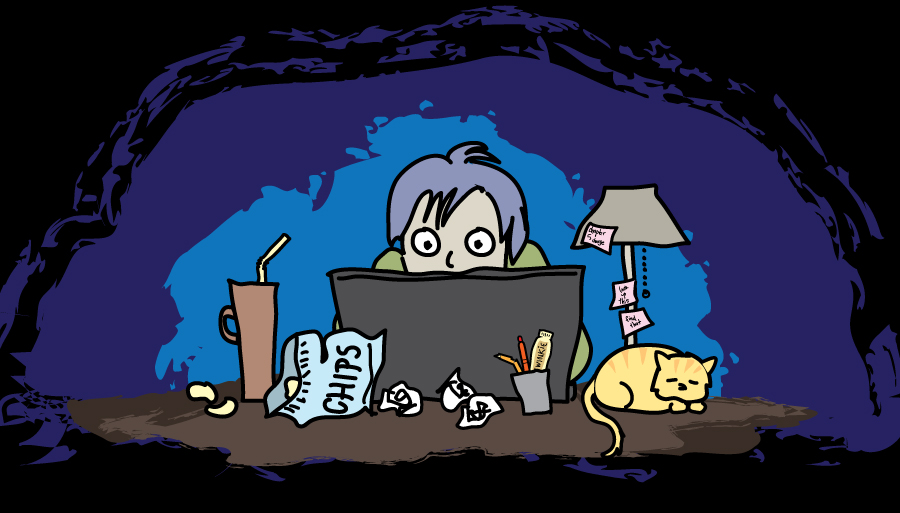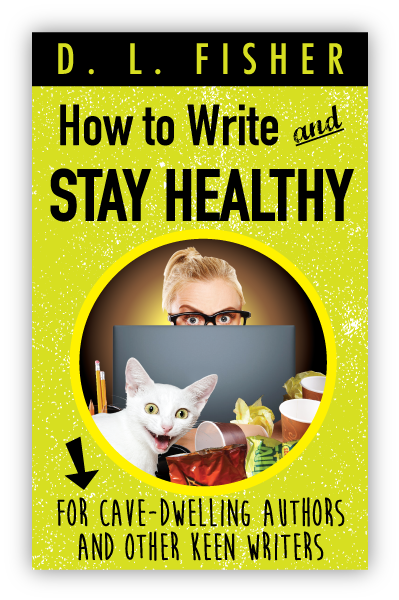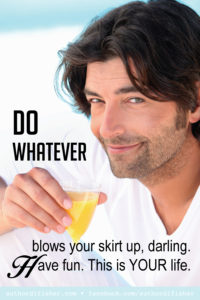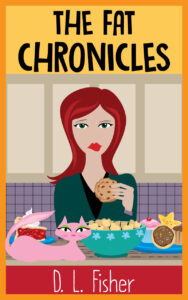
Thanksgiving – Bust a Gut
Entry 1
Every year I tell myself I will NOT do the same darn thing.
I’m talking about the annual holiday pig-out. The one that starts at Thanksgiving and peters out during that really boring week between Christmas and New Year’s Day.
Piling on the pounds eating nonstop for weeks renders half my closet useless, forcing me out of my cute clothes and into the fat rags. It makes me do crazy things, such as trying a new hairstyle with the insane expectation that it will make me look thinner.
As soon as the stores start rolling out the holiday merchandise, I’m hooked. Shelves with Thanksgiving patterns on plastic plates blending seamlessly into Christmas aisles laden with sparkly, tis-the-season decorations all conspire to send me straight to the bakery. Animatronic Santas smile and wave as if to say, Look at me. It’s perfectly fine being obese. Everybody loves my rotundity. Cookies and milk are good for you! I’m really fat and I can still make it down the chimney.
As if nature is in collusion with the holiday urge to eat baked goods, the weather is colder, and my body wants to put on fat for insulation. I keep telling my body that we humans now have electric heating, but the craving for cookies and pies persists like an itch underneath the ribs that can’t be scratched no matter how much you try.
It’s like the world takes a vacation between November and January. All my common sense goes into a coma. Cookies, cakes, pies and candies surround me like an occupying army. At every turn there is a conveyor belt of desserts being offered with a knowing wink and a permission slip to Indulge, indulge—you can diet after the holidays.
It makes me a little nauseous just writing about this.
I eat so much junk this time of year I never have room left for any real food. But then I’m still hungry so I eat more junk.
Even as I’m shoveling homemade peanut butter cups and adorable cupcakes into my mouth, my foggy frontal lobe is trying to tell me something but I can’t quite hear it over Burl Ives singing Rudolf the Red-Nosed Reindeer. My stomach is also trying to tell me something, but I’m too busy deciding between the fudge and a piece of pecan pie.

It all starts with Thanksgiving.
Thanksgiving breaks the spirit of rationality. Mothers and grandmothers everywhere slave in a hot kitchen for days in order to shower their progeny with edible love. Barrel-sized bowls of potatoes are mashed with gallons of cream and huge slabs of butter. Pumpkin pies are turned out by the dozen. Side dishes in holiday dinnerware accumulate until they overflow onto every available surface.
Special dishes, glasses and silverware are unearthed and dusted off. Huge tablecloths are snapped to crispness and laid over extended tables. Steam just keeps rolling out of kitchens, where aproned and harried women can be glimpsed performing feats of greatness in record time.
And then the presentation begins.
The table is loaded and sagging from the weight of the feast. It’s time to eat. There are so many choices, even if a tiny teaspoonful of each dish is taken, there is not enough room on the plate. The matriarchs scan the table with eagle eyes, noticing who has not tried the sweet potatoes or taken a jiggling disk of cranberry sauce. Their martyred faces when everyone doesn’t stuff themselves up to the eyeballs are legendary.
So how can I say no when the pies are rolled out with Costco-sized tubs of whipped cream? My belly is so distended at this point I can’t even sit up straight. I have to fork the pie in half lying down, and carefully, because my stomach is churning its contents up into my esophagus.
After feeble attempts to resist the pig-out, I give in and acquiesce to nonsensical expansion. I tell myself, Okay, this happens every year. You know—this is me talking to myself—for the next month there will be no getting around the constant barrage of fat faire being offered with good cheer. You can make a New Year’s resolution and dump the holiday pounds then.
And so it begins. Again.
Entry 2
It’s Thanksgiving Eve morning.
In other words, it’s the day before Thanksgiving. To put in another way, it’s the last time my stomach will feel empty for weeks.
I sit at my computer drinking a green smoothie. Yes, my friends, I am drinking raw, very dark green kale. I get the kale all chopped up and washed, because I figure if it’s easy, I can talk myself into doing something healthy.
Why would I choose liquified kale over pancakes smothered in butter and syrup for breakfast?
For the same reason I went to hot yoga last night. I mean to shrink as many fat cells as possible before the holiday binge begins. (It’s actually already begun because Marie Callender’s frozen pumpkin pies were on sale and I had to buy one to save money. And because I got the pumpkin pie I had to get whipped cream or what would be the point?)
Have you ever gone to hot yoga? You can burn hundreds of calories in one hour sweating out of every pore. And I mean every pore. Even your hair sweats. And if your hair is full of products like mine is, you’d better wear a headband so you don’t get hairspray in your eyes.
Hot yoga is like vacationing in a bayou swamp in August because of cheap off-season rates. You can almost hear insects the size of fists buzzing around your head as humidifiers just keep pumping out the hot steam. The room is controlled by masochistic instructors obsessed with handheld thermometers, making sure hotter-than-the-core-of-the-Earth temperatures stay cranked. Clouds of sweaty gases roll off every inch of your body and mingle with everyone else’s sweaty gases. That’s when you have to practice being a yogi and focus, focus, on anything but guessing what the guy next to you ate for lunch based on the smell of his sweaty gases.

So back to why I torture myself with swamp yoga and green smoothies. Because I know, I just know that tomorrow I am going to stuff myself to the gills, or rather, to the eyeballs. I haven’t had gills since I was a tiny fetus swimming around in amniotic fluid. Which, come to think of it, is pretty darn icky. I wouldn’t want to be mulling that over while sipping my green smoothie. But I digress.
By the time Thanksgiving dinner is served, I am traditionally already stuffed with appetizers and cute little cookies. I have tried to arrive fashionably late, just in time for the main meal, but invariably the dinner deadline is always pushed forward. No matter what time I roll in, the kitchen women (mothers, grandmothers, aunties, and aproned neighbors all wielding mixers, pots, and wooden spoons) announce that I’m right on time; dinner won’t be ready for another hour; have a cookie from this industrial-sized tray of dazzling baked goods in the meantime!
I always tell myself that I won’t eat the bread with dinner and that will make all the difference. This does not take into consideration that I am already full when I sit down to eat. Neither does it take into consideration that I love the bread. I tell myself, Pace yourself, self, don’t shovel in food before you assess your game plan. But my game plan has a habit of evaporating the minute the table is loaded and I must select from so many dishes I lose count.
My game plan usually involves promises to myself that never seem to gain traction when I’m up against it. The promises go like this:
- I promise to skip the tempting pre-dinner appetizers and cookies.
- I promise to eat small portions.
- I promise to stop eating when I am full.
- I promise not to eat those totally yummy, golden-brown, deliciously warm dinner rolls smothered with melting butter.
- I promise to take only one tablespoon of mashed potatoes, which already have butter whipped into them so I don’t need to add extra butter on top before I pour gravy over the lot.
- I promise to only take what I really love, and not be guilted into cranberry sauce or canned yams.
- I promise to eat salad, if there is any. (This is an easy promise to keep, since there never is any, unless you count the carrot salad with raisons, but as it generally happens, I run out of room on my plate when I get to that dish.)
So, fortified with a green smoothie and 60 minutes of swamp yoga, I am ready to face tomorrow, my game plan, and Thanksgiving dinner.
I think.

Entry 3 – The Mother Load (No, that’s not misspelled)
It’s the morning after Thanksgiving and I’m starving.
(Don’t worry, I haven’t skipped the actual appalling event. We’ll get to that in a bit.)
I just got some coffee, and my stomach is begging for food. I feel like I haven’t eaten in a week.
Is it because I exercised restraint yesterday and followed through with my game plan?
No.
I’m hungry because there has been a break in the flow of gluttony. After shoveling in everything from potatoes to pie all Thanksgiving Day as if my tongue had sprouted gears and turned into a conveyor belt, the fat-manufacturing machinery of my body eventually ground to a halt, the gears stopped, and I had to sleep because I was utterly exhausted.
It’s really hard work packing the food in, layer on top of layer on top of layer.
My stomach is apparently confused this morning. I can imagine my stomach saying to me, What the heck just happened? I’ve been churning various food stuffs (some stuffs extremely questionable as to whether or not they can be categorized as food) continually for hours and hours straight and well done I say, because I didn’t make you puke once to create room for more crap you kept shoveling into me, and now what? Now what do I do? I don’t remember how to stop churning.
I blame it on the appetizers.

Rewind to Thanksgiving Day
The biggest problem with appetizers is not that they look so appetizing (they do) or that I’m hungry (I’m not)—it’s because I have to find an excuse to stay out of the kitchen where the women are slaving away with Einstein hair because of the steam, and occupy myself in order to avoid watching football on the television in the den where all the men are whooping it up.
So I station myself in-between at the appetizer table. I tell the women I am starving, and this excuses me from the kitchen slave pit where the heat would not only frizz my hair but also melt my makeup and make me look hideous. And I can’t just stand there staring at hors d’oeuvres and sugary baked goods, shifting from one foot to the other awkwardly. I must play the part.
So I nibble on a tiny toast with a tiny slice of cheese. This doesn’t take very long. I scan the table for my next snack, trying to look busy. There are Ritz crackers topped with unidentifiable layers of sugary substances. Dips and chips galore in festive holiday bowls. Pumpkin, banana, and cranberry breads sliced and collated. Cookies of every imaginable configuration arranged on trays the size of table tops.
I toggle between sweet and salty. After something sweet, I delude myself into thinking that something salty will magically cancel out the sweet calories. After a cookie, I go for some chips with dip. After a few chips I grab a slice of pumpkin bread. I successfully occupy myself in this manner avoiding eye contact with the women, who are pumping out dishes with a mastery born of millennia of cell memory, when they fed whole tribes.

When I come to—I have already almost put myself into a food coma—I realize my clothes feel tight at the waist. At this point I am filled with regret about my choice of outfits. I simply couldn’t sacrifice fashion for comfort, and now here I am, wishing I’d worn a loose dress (if I had one) instead of the fashionable Guess jeans, tight sweater, and Italian boots I got at Ross for a quarter of their original price. Not to mention I’m HOT. The cooking in the kitchen has ramped up for its finale and the steam clouds are now rolling out into the rest of the house.
I’m already stuffed, overheated, and uncomfortable. Why didn’t I bring a cute little t-shirt to change into?
And dinner hasn’t even been served yet. I anticipate a very, very long day. I tell myself, Self, you can do this. Just embrace the horror.
The announcement to sit down for dinner is made by one of the neighbor women sporting an apron with a large cornucopia printed on the front, as she brushes back her Einstein hair. I hear the TV room go silent and the whooping cease. The men are now rising up and emerging from the den in a clump, heading toward the feasting prepared by their women as is their due.
My Uncle Todd is wearing a Viking helmet and carrying a battle axe—oh no, he’s not, that’s just the delirium from my massive intake of sugar talking.
The table is groaning with pounds of food. The sideboard, the countertops, and all horizontal surfaces are overflowing with Thanksgiving faire—much of which is only seen at Thanksgiving. Take the cranberry sauce for example. The manufacturers of canned cranberry sauce must make all their profits in two weeks of the year. Never mind that no one likes it particularly. It’s a tradition and one must partake.
The men all spoon heaps of everything onto their plates, with no mind to pacing themselves. They start stacking food on top of food when the plate runs out of room. Dinner rolls are balanced precariously on the top of the heap.
They don’t seem to care at all that it’s hot, that their waists are expanding, or how many calories they are consuming. Uncle Todd is already asking about the pies.
Well of course, mens’ pants fit below the belly, allowing for indeterminate expansion and comfort no matter how much is stuffed into their gullets. I read somewhere that a male’s metabolism is 17.5% higher than a female’s. It’s so unfair. That’s why they can chow down on deviled eggs, bowls of Chex mix and bottles of beer, and then pile their plates like Vikings just home from months at sea.

As is right and proper, grace is said before the eating begins. It’s always a little off kilter however, as some of the guests have already tasted their mashed potatoes or Aunt Wanda’s green bean casserole with cream of mushroom soup and French-fried onions. That’s aside from the fact that everyone has already been jamming food in since they arrived.
Invariably a child is asked to say grace. All the young people at the table(s) under the age of sixteen are trying to blend into their chairs when the matriarch—my centenarian grandmother—scans the table for a likely candidate. The really little ones are already having fun at the tiny Barbie table, excused from the ordeal of having to construct a suitable prayer to the Almighty, in front of all the family and friends.
I see sweat bead up on a few young foreheads. Stage fright can be so debilitating. Gramma selects Brandon, a pimply thirteen-year-old bass player in a middle school rock band, sitting at the card table attached to the expanded dining table, whose face has turned red making his pimples turn purple. It’s even worse because the card table is slightly lower than the dining table, and the extra chairs relegated to it are from his little sister’s play table, so Brandon’s head is a foot below the adults’ all staring at him.
He clears his throat with an expression halfway between desperation and terror. His voice squeaks a little from an overly excited, underdeveloped Adam’s apple. One can’t say no to Gramma on this, her day of undeniable queen-hood over the family. His prayer is barely above a whisper—something about God being great and God being good—and finally the clanking of forks, knives and spoons fills the air. Brandon does not look as though he is recovered even after everyone stops staring at him.
I am coveting the warm, buttery, soft, siren-like dinner rolls. They are beckoning with persistence and promises they can’t keep. Go ahead, they say, take me. It’s just one day, and I am just a very small hunk of delicious white bread. Just one can’t hurt. Go ahead.
I look at my plate, already filled to the max with three kinds of potatoes, four kinds of vegetables, a gratuitous dollop of carrot salad, a smidgen of cranberry sauce, and a variety of other traditional feasting items threatening to breach the plate perimeter.
But the dinner rolls continue to beckon. So I give in. I butter the dinner roll and a part of me dies. The part with any vestige of willpower left. There is a larger part of me thriving at the moment—the part that manufactures fat cells.
Can it get worse?
I actually, beyond imagining, go back for seconds of mashed potatoes and stuffing, smothered in gravy. I have lost my mind. But my brain is still alert enough to hide the carrot salad I didn’t eat with a bit of gravy. I smile at Gramma. She smiles back but her eyes pierce like a hawk’s.
My clothes feel like a body corset, the straps pulled so tight I can’t breathe. Standing up is even a challenge. I must lift my butt first and lean back so I don’t fold at the waist too much—if I do the food, already packed in halfway up my esophagus, will simply be squeezed out of my mouth like toothpaste from a new tube given the least amount of pressure.
The women all start the changing of the plates (from dinnerware to dessert-ware) and covering dishes for snacking on leftovers later. The pies are revealed. Tubs of whipped cream are unearthed. The question, Who has room for pie?, is not even asked. No one has room for pie. But that does not seem to be an issue.
I ask for a very small piece of pie. This is taken to mean a 3-inch slice which is significantly smaller than the “man” portion. At this point I wish I could burp. I ask for any carbonated beverage available thinking it will allow some air to escape and relieve some of the pressure. Ginger ale does make me belch, but with it comes undigested food and I get to taste Aunt Wanda’s green bean casserole again.
Ick and more ick. My one consolation is that most every other adult is in the same condition I am. When I use the restroom, I experience a moment of bliss when I unzip my Guess jeans and release my severely restricted lower abdomen. Having to squeeze back into them however, negates any benefit from the bliss. I avoid looking at my midsection as I wash my hands. I know it’s not pretty. And a side view would just about do my ego in.
I decide to help the women do some clean up. The football games have resumed in the den but the whooping is less enthusiastic. The kitchen is jammed. The dishwasher is vibrating like a 1950’s washing machine and the sink is piled high with soaking pots. It’s like a Dr. Seuss story about the Chubs from Chubsville.
Then comes the afternoon lull. Everyone is dazed and half asleep. Some of the men are emitting loud snores. The kids have scattered. And the women are shuffling about bagging leftovers for guests and next-day soups. With this much food complexity, organization is key.
Then the most unbelievable part of Thanksgiving happens.
The picking at leftovers begins. Whole plates of food are microwaved. As soon as stomachs have passed enough contents off to the small intestines, there are spaces that can be refilled.
And of course, after one eats another plate of food, one must balance that with a visit to the dessert trays and pies which are not really pies without whipped cream. And so it goes, until one rolls one’s self out of the house, down the sidewalk, and into one’s car, where one can unzip one’s pants in hopes one isn’t stopped for speeding, which would create a situation whereby one would have to surreptitiously zip back up before the police person got to one’s car window.
I get home after Thanksgiving dinner (if an eating marathon of that magnitude can be called such) without incident. It’s absolute heaven to take off my clothes and snuggle into loose pajamas. I crawl into bed and watch Netflix, while munching on leftover pie and cookies now that my stomach isn’t corseted anymore.

I still may have time today, the day after Thanksgiving, to cash in on some of the Black Friday sales. I’m going to need some slightly larger jeans with stretch denim to get me through the rest of the holidays.


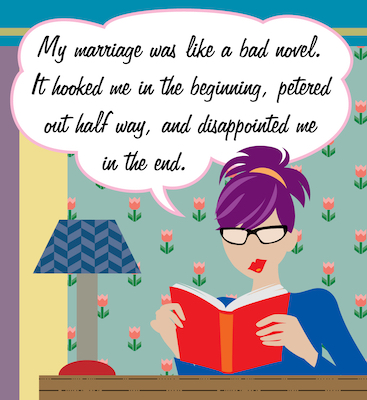
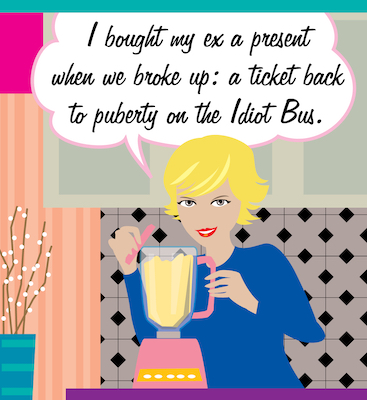


 Relax, sit back, and daydream away.
Relax, sit back, and daydream away.